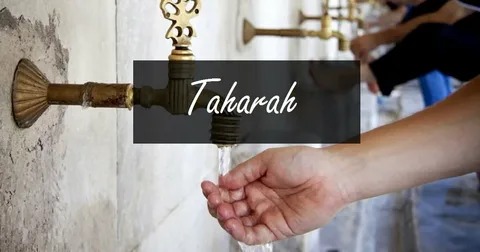In a world bustling with activity and distractions, the concept of Taharah, often associated with Islamic practices, emerges as a profound way to attain spiritual and holistic well-being. Taharah, translated as purity, extends beyond religious boundaries, offering a universal approach to cleansing the body, mind, and soul, in this article on Arabian Tongue we will explorer benefits of taharah.
Definition of Taharah

Taharah, rooted in Arabic, signifies cleanliness and purification. Beyond the physical realm, it holds a deeper spiritual connotation, emphasizing the purity of one’s heart and intentions.
Significance in Various Cultures
While prominently observed in Islamic traditions, similar concepts of spiritual purity exist in various cultures and religions. Understanding these common threads fosters intercultural appreciation and unity.
Benefits of Taharah
At its core, Taharah involves the cleansing of the soul. Through rituals like ablution (Wudu) and ritual baths (Ghusl), individuals symbolically wash away impurities, paving the way for spiritual connection and growth.
Connection with the Divine
Taharah establishes a direct link with the divine. By purifying the self, believers aim to enhance their connection with a higher power, fostering a sense of purpose, gratitude, and inner peace.
Purification Rituals
The physical acts involved in Taharah rituals extend beyond symbolism. Ablution and ritual baths have tangible benefits, promoting personal hygiene and preventing the spread of diseases.
Stress Reduction
Research indicates a direct correlation between ritualistic practices like Taharah and stress reduction. The meditative nature of these rituals helps calm the mind, reducing anxiety and promoting mental well-being.
Building Stronger Communities
The practice of Taharah extends beyond individual benefits, contributing to the creation of harmonious communities. Shared rituals foster a sense of belonging, encouraging mutual respect and understanding.
Enhancing Interpersonal Relationships
As individuals undergo the transformative journey of Taharah, they often find themselves better equipped to navigate relationships. Improved emotional regulation and empathy contribute to healthier connections with others.
Ablution (Wudu) and Ritual Bath (Ghusl)
Exploring the specific rituals of Taharah, ablution (Wudu) and ritual baths (Ghusl) hold unique significance. Understanding the intricacies of these practices allows for a more profound engagement with spiritual purification.
Impact on Mental Clarity
Beyond the spiritual realm, Taharah has a tangible impact on mental clarity. The focused and intentional nature of the rituals promotes mindfulness, enhancing cognitive function and decision-making.
Quranic References
Taharah finds explicit mention in the Quran, Islam’s holy book. Verses emphasizing the importance of cleanliness and purification serve as a guide for believers seeking a deeper connection with their faith.
Prophetic Practices
The traditions of Prophet Muhammad (peace be upon him) provide practical insights into the implementation of Taharah. By following these practices, believers aim to emulate a way of life that embodies spiritual purity.
Similar Practices in Other Religions
Beyond Islam, other religions incorporate practices akin to Taharah. Exploring these similarities fosters a broader understanding of shared values and promotes interfaith dialogue.
Types of Taharah

Islamic teachings emphasize the significance of Taharah as a prerequisite for engaging in acts of worship. It symbolizes spiritual cleanliness and reflects the respect Muslims have for their connection with the divine.
Taharah of the Body
- Wudu (Ablution): Wudu involves the washing of the face, hands, arms, head, and feet. It is a symbolic act of purification before entering a state of prayer or connecting with the divine.
- Ghusl (Full Body Purification): Ghusl is a comprehensive purification ritual that includes washing the entire body. It is required after specific impurities or situations, such as post-menstruation or intimate relations.
Taharah of Clothes
- Guidelines for Clean Attire: Islamic teachings encourage wearing clean and modest clothing, reflecting the importance of external purity in spiritual practices.
- Significance of Wearing Clean Clothes in Islamic Rituals: Clean attire contributes to the overall state of Taharah, ensuring that the outward appearance aligns with the inner cleanliness sought in prayer and worship.
Taharah of the Environment
- Importance of Cleanliness in the Surroundings: A pure environment is conducive to a focused and spiritually uplifting atmosphere. Muslims are encouraged to keep their surroundings clean to enhance their connection with the divine.
- How to Maintain a Pure Environment: Practical tips for maintaining a clean environment include regular cleaning, proper disposal of waste, and fostering a sense of collective responsibility within the community.
Taharah in Specific Situations
- Taharah During Menstruation: Islam provides specific guidelines for women during menstruation, emphasizing cleanliness, and offering alternative acts of worship during this period.
- Spiritual Significance: The temporary pause in certain rituals during menstruation is not a sign of impurity but a recognition of a natural biological process, highlighting the holistic approach to spirituality in Islam.
Learn Now: Quran Ijazah Course for Kids
Taharah After Intimacy
- Ghusl Requirements: After intimate relations, Ghusl is required as a purification ritual. It serves as a symbolic act of cleansing and preparation for reengaging in religious activities.
- Symbolism of Purification: The act of Ghusl after intimacy symbolizes the importance of approaching prayer and worship with a pure heart and body, reinforcing the connection between physical and spiritual cleanliness.
Practical Tips for Maintaining Taharah
- Daily Practices for Cleanliness: Incorporating daily practices such as regular ablution, wearing clean clothes, and maintaining a clean environment contributes to a continuous state of Taharah.
- Incorporating Taharah in Daily Routines: By integrating purification rituals into daily routines, individuals can ensure that Taharah becomes a seamless part of their lives, reinforcing its significance in their spiritual journey.
- Taharah in the Quran and Hadith: The Quran and Hadith contain numerous references emphasizing the importance of cleanliness and purity, underscoring Taharah as a fundamental aspect of Islamic teachings.
- Prophet Muhammad’s Teachings on Cleanliness: Prophet Muhammad’s actions and sayings provide guidance on cleanliness and purification, setting an example for Muslims to follow in their daily lives.
FAQs
Is Taharah only relevant to Islamic practices?
While deeply rooted in Islamic traditions, the concept of spiritual purity is universal. Similar practices exist in various cultures and religions worldwide.
How can Taharah contribute to environmental sustainability?
Taharah promotes water conservation through mindful use in rituals, aligning with broader principles of sustainable living.
Can non-religious individuals benefit from practicing Taharah?
Absolutely. Taharah's focus on personal discipline, mental clarity, and stress reduction transcends religious affiliations, offering benefits to individuals seeking holistic well-being.
How can one overcome resistance to incorporating Taharah into daily life?
Start gradually, set realistic goals, and seek support from communities or mentors who can provide guidance and encouragement.
Are there secular alternatives to Taharah for achieving similar benefits?
While the rituals may differ, secular practices like mindfulness meditation and self-care routines share common ground with Taharah in promoting mental well-being and personal growth.
Conclusion
In conclusion, the benefits of Taharah extend far beyond religious boundaries. This holistic approach to spiritual purity impacts the individual, communities, and the environment. By embracing the rituals of Taharah, individuals embark on a journey of self-discovery, personal growth, and a deeper connection with the divine.


